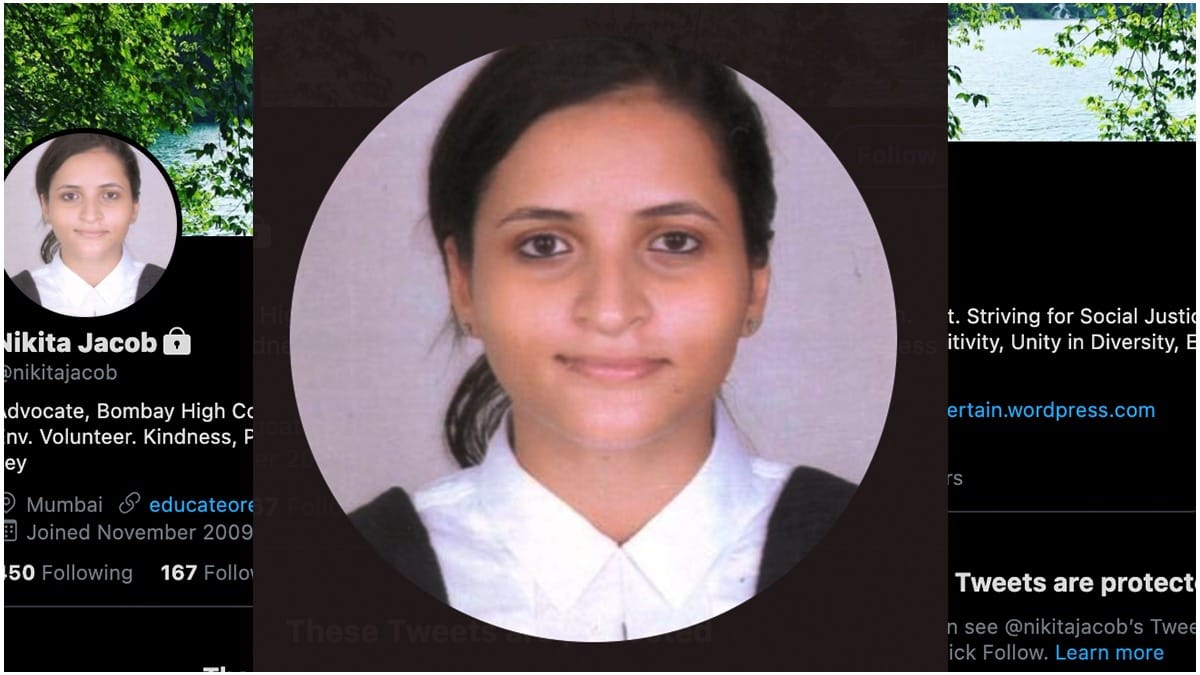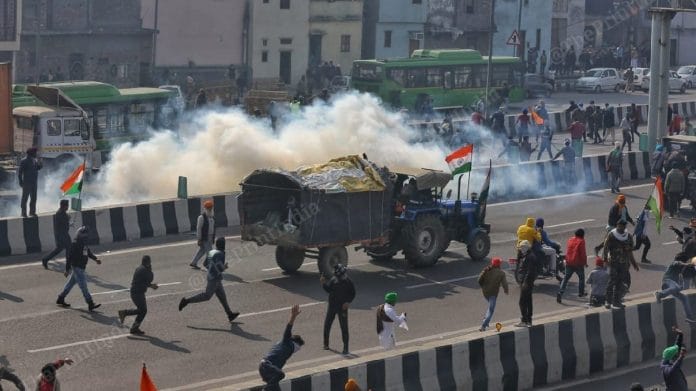Mumbai: On 7 February, 34-year-old Shantanu Muluk was at a cousin’s wedding, being ragged by relatives about when he plans to tie the knot.
“We were having fun pulling his leg and he was getting embarrassed with the conversation as usual. Everything was normal,” Shantanu’s cousin Sachin Muluk told ThePrint.
About a week later, a string of unexpected events shattered this sense of normalcy. Shantanu went incommunicado. A Delhi Police team visited his house at Beed in Maharashtra’s Marathwada region, and a non-bailable warrant was issued against him in Delhi.
Shantanu, an engineer by qualification, is under Delhi Police’s scanner for a farmers’ protest toolkit tweeted by climate activist Greta Thunberg that is being investigated in connection with the violence that erupted in the national capital on Republic Day.
On 4 February, Delhi Police filed a case against unknown persons in connection with the toolkit, invoking charges such as sedition, criminal conspiracy, promoting enmity between religions, and provocation with an intent to cause a riot.
Muluk is one of two people from Maharashtra facing a non-bailable warrant in the case.
The other is Mumbai-based advocate and activist Nikita Jacob, 30. While Muluk and Jacob secured transit anticipatory bail from the Bombay High Court in February before they could be arrested, a third accused — Bengaluru-based activist Disha Ravi — was arrested but released in the last week of February.
The trio is accused of editing, creating and disseminating the toolkit. Delhi Police claims “one woman named Puneet, based in Canada” put the three “in touch with the pro-Khalistani Poetic Justice Foundation and through them created a toolkit titled Global Farmers Strike and Global Day of Action 26 January”.
Come Tuesday, a Delhi court will chart out the road ahead for the bail pleas moved by Jacob and Muluk. On 26 February, the court had granted Muluk interim protection from arrest till 9 March, in continuation of the 10 days’ transit bail given to him by the Bombay High Court on 16 February. On Tuesday, a decision will be taken on his regular bail plea.
On 2 March, the same court gave Delhi Police a week to file a response to Jacob’s plea seeking anticipatory bail in the case, after the public prosecutor said the agency needed time to file a detailed reply in the request. On Tuesday, after police file their reply, her lawyer will argue why she should be granted bail
Muluk, Jacob and Ravi have been associated with Extinction Rebellion (popularly known as XR), an international movement focusing on climate change and ecological causes with volunteers across India.
According to people known or close to Muluk and Jacob — as also Ravi — they are passionate environmental activists. In his bail plea, Muluk has sought to challenge the “false blot of anti-national” lobbed at him, while Jacob has said that the only intention she had behind participating in the toolkit was to create awareness about the farmers’ protest.
Ravi, too, has dismissed attempts to link the toolkit to the violence that erupted on Republic Day.
Also Read: Greta toolkit ‘tip of iceberg’ — India sees ‘organised attack piggybacking’ on farm protest
Shantanu — an engineer from a political, influential family
Shantanu grew up in Beed, a district in Marathwada that is known to be constantly water-stressed and has been reporting a high number of farmer suicides.
He completed his graduation at the Aurangabad Government College of Engineering before going to the US for a Master’s in aerospace engineering.
His father Shivalal Muluk and cousin Sachin have been associated with the Shiv Sena, but Shantanu has never shown any interest in politics or ever worked for the party, those known to him say.
“Shantanu is from one of Beed’s most well-known families. His father is a former municipal council president. His cousin brother is a Shiv Sena functionary, but Shantanu doesn’t have any history of being in politics,” said Ashok Tangade, a civil rights activist in Beed. “Neither the family nor Shantanu has had any history of any seditious behaviour in any way. He must have been associated with the farmers’ protests simply because of his passion for environmental activism.”
Shivalal Muluk was a Shiv Sena councillor and municipal council president around 1995-96.
Added Sachin, who is now the Beed district president for Shiv Sena, “A few years later, he withdrew from politics and decided to focus on his business related to hotels and construction. After that, I entered active politics and became associated with the Shiv Sena. Shantanu’s father has done a lot of social work as a politician and our family has a great reputation in Beed.”
Shantanu, Sachin said, “was always more focussed on academics”.
“He reads a lot. He developed a passion for environmental causes after his return from the US, about six years ago. In casual family discussions, he would tell us about how things are done in the US, and what we can do here to make things more environment-friendly,” he added.
After returning from the US, Shantanu briefly took up a job in Aurangabad before moving to Pune, Sachin said.
Shantanu moved back to Beed after the government imposed a lockdown during the Covid-19 pandemic, and had been living with his family for the past one year.
Shantanu’s mother, Sachin said, is a homemaker, and his younger brother is working in the US.
Shantanu’s friends and family describe him as a shy, quiet person who never speaks out of turn and loves to travel, read and watch Star Wars.
While in Pune, Shantanu got associated with the local chapter of Extinction Rebellion towards the end of 2019.
“Shantanu was highlighting issues from the region he comes from, as well as conducting research work on climate change and ecological issues. He would also correspond with academicians and researchers,” said a friend who did not wish to be named.
Explaining Shantanu’s bent towards environmental issues, a fellow activist who did not wish to be named said he “has seen farmers’ suicides first hand”.
“Beed gets water once in every 10 days and there is a constant drought, just like in most of the rest of Marathwada and Vidarbha. He has seen farmers’ suicides first hand. So, Shantanu left his job to work for the climate and environment full time.”
Shantanu, the activist added, now works as a researcher on environmental issues, and has been a part of various environmental justice reading groups and discussion circles.
“He also provides consultant services on inclusive communication and synergy for the marginalised groups across the world with the object of amplifying the voices of the unheard who don’t have the privilege to speak up,” the activist said.
“Shantanu has been key in forming alliances between environmental groups in India and guiding youth-led groups against exploitation of environmental resources.”
In his bail petition to the Bombay High Court, Shantanu said it will be “destructive for his life and his family to carry a false blot of being an anti-national”.
Also Read: What is toolkit? Document key to tech-era protests that has landed Disha, Nikita in trouble
Jacob — a ‘new name’ in environmental activism
Jacob studied at the St Joseph’s Convent School in Panchgani and completed her junior college at Mumbai’s St Xavier’s College. While at college, she volunteered for Xavier’s famous Malhar festival, and also played basketball and table tennis.
She studied law at Pune’s ILS Law College, and played table tennis at the inter-collegiate level. At law school, Jacob was also part of the college’s human rights cell.

Jacob has been a practising lawyer at the Bombay High Court since 2014. She is, however, a less known name in Mumbai’s environmental activism circles. Two of Jacob’s colleagues who did not wish to be named told ThePrint that she got actively involved in environmental issues only last year.
An environmental lawyer said, “I had multiple interactions with her over the last year. I am actively involved in cases related to the Save Aarey movement, river cleaning, pollution and so on. She got in touch with me through a common contact to understand the legal and environmental aspects of the Aarey Metro car shed and the coastal road.”
The erstwhile Maharashtra government’s proposal to set up a Metro car depot at Aarey Colony — known as the lungs of “concrete jungle” Mumbai — had drawn immense opposition from activists, environmentalists, and members of the general public. Last year, the Uddhav Thackeray government decided to move the car shed to an alternative location in Kanjurmarg, but the land is embroiled in a legal tussle.
The Mumbai coastal road project, too, has faced opposition from environmental activists as it involves reclaiming 111 hectares of land from the sea.
An environmental activist who has worked with Jacob said she became a volunteer with Extinction Rebellion last year.
“She was helping out with legal issues wherever required. She researched a lot on the Aarey forest and the coastal road projects. She has also been very active in organising efforts in the build-up to COP26 (the 26th United Nations Climate Change Conference, scheduled to be held later this year in Glasgow) to make the public understand what we must expect from our governments,” he said.
In her petition before the Bombay High Court, Jacob admitted to having been a part of creating a toolkit about the farmers’ protests, but said it was to spread awareness about the issue and encourage peaceful participation. She added that she had no religious, political or financial motive in researching, editing and circulating communication packs or toolkits, “let alone to incite violence or riots”.
Stalin Dayanand, an environmental activist who was at the forefront of the Save Aarey campaign, said, “Save Aarey had hundreds of NGOs in it and thousands of ordinary citizens. The name Nikita Jacob doesn’t stand out. But, I understand that she was part of a group of well-intentioned youngsters who understand the gravity of the situation.
“Groups such as Extinction Rebellion and Fridays for Future have been very active, galvanising support through social media.”
Also Read: ‘Our names are on document…we can get UAPA’ — what police say they found on Disha Ravi phone
Extinction Rebellion in India
The Extinction Rebellion came to India in 2019, a few months after it took form in the UK in 2018.
The movement was born out of a ‘Declaration of Rebellion’ against the UK government when an estimated 6,000 people blocked five major bridges across the River Thames and planted trees in the middle of the Parliament Square.
In India, the movement, which is volunteer driven, has manifested itself in the form of peaceful but visually loud protests.
The movement first made news in Mumbai in October 2019 when volunteers tried to assemble at Bandra Reclamation to urge the government to declare a climate emergency by staging a mock die-in. Police, however, dispersed them within 20 minutes.
Around the same time, XR volunteers started the ‘Red Saree Brigade’, on the lines of the ‘Red Brigade’ in London. Volunteers dressed up in red sarees, kurtas and robes with a green bindi on faces painted white — a street performance meant to catch the public eye and highlight the significance of climate change.
XR has also staged mock die-ins in other Indian cities such as Pune, formed human rakhis, as well as canvassed among children by calling for a mass bunk in Delhi to emphasise the seriousness of climate change — a protest tactic that first brought Thunberg to global attention.
XR has volunteers across the world. Indian chapters have been set up in cities such as Mumbai, Pune, Bangalore, Kochi, Chennai, Delhi, Guwahati, Visakhapatnam, and Hyderabad
Also Read: ‘Hang them’ — YouTuber threatens journalists in now deleted video ‘exposing’ Greta toolkit







Climate activists should divert time/energy towards planting saplings all over the country. These fancy dharnas serve no purpose. All are aware of Glocal Warming etc.
“Passionate environmental activism” is all very noble, but when you cross the line into anti-national activities and illegality, why do you expect sympathy?